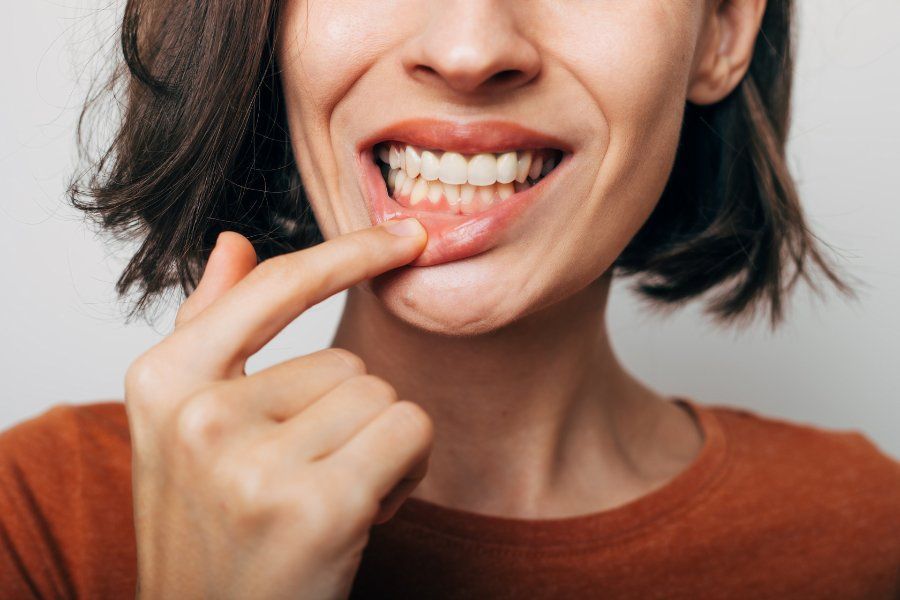Gum Disease

Gum disease, also known as periodontal disease, is a common infection and inflammation affecting the gums and the underlying bones that support your teeth. Many adults experience some form of this condition during their lifetime, lifetime, often without recognizing its presence in the early stages.
Gum disease is the leading cause of tooth loss in adults. Research continues to uncover links between periodontal health and overall systemic health, including conditions like heart disease, diabetes, and respiratory issues. At Dental Arts of Cherry Hills, we prioritize the early detection and effective treatment of gum disease to protect not just your smile but your overall well-being.
Difference Between Early vs. Advanced Gum Disease
Gum disease progresses in stages. Understanding the difference is key to seeking timely treatment.
Gingivitis – The Early, Reversible Stage
Gingivitis is the earliest stage of gum disease. It starts when plaque, a sticky, bacteria-laden film that builds on the teeth over the course of the day, isn't effectively removed from around your teeth, especially near the gumline.
Your body reacts to these bacteria, causing your gums to become inflamed. You might notice:
- Redness & Swelling: Instead of being firm, pink, and snug against your teeth, your gums might look puffy, slightly enlarged, and have a brighter red or even purplish hue.
- Bleeding: Seeing blood in the sink after brushing or flossing is a very common sign. Healthy gums generally don't bleed with gentle cleaning.
- Tenderness: Your gums might feel a bit sore or sensitive to the touch.
The most important thing to know about gingivitis is that it only affects the soft gum tissue. At this stage, the inflammation has not yet damaged the underlying bone or the fibers that hold your teeth in place. This means gingivitis is completely reversible with prompt professional cleaning to remove the plaque and tartar buildup, combined with consistent, thorough brushing and flossing at home.
Don't ignore these early signals!
Periodontitis – The Advanced, Damaging Stage
When gingivitis isn't treated, the persistent inflammation allows the infection to progress deeper, below the gumline, leading to periodontitis. This is a more serious and destructive stage of gum disease.
Periodontitis is diagnosed when bacteria start to damage the actual support structures of your teeth. This includes the periodontal ligaments and the alveolar bone (jawbone).
Signs of periodontitis include:
- Gum Pockets Form & Deepen: As the supporting fibers break down and bone is lost, your gums detach from the teeth. This creates spaces or "pockets" along the tooth root. These pockets harbor harmful bacteria and are impossible to clean effectively with just a toothbrush and floss.
- Gum Recession: The destruction of bone and tissue can cause your gums to shrink back or "recede," exposing more of the tooth root and making teeth appear longer.
- Persistent Bad Breath: The deeper infection often causes a noticeable and persistent unpleasant odor.
- Pus: You might see yellowish pus oozing from between your teeth and gums, especially when pressure is applied.
- Changes in Bite or Loose Teeth: As significant bone support is lost, teeth can begin to shift, drift, or feel loose. This is often a sign of advanced periodontitis. Pain may or may not be present until this later stage.
It is important to note that any bone loss is permanent and irreversible. While it is not possible to regrow lost bone, treatment is crucial to:
- Stop the disease progression
- Reduce pocket depth
- Control the infection
- Manage the condition long-term
This requires professional intervention, like deep cleaning, and consistent follow-up care (periodontal maintenance) to prevent further destruction and potential tooth loss.
Risk of Gum Disease
While poor oral hygiene is the primary cause, certain factors increase your risk of gum disease:
- Smoking or using tobacco products
- Genetics or family history of gum disease
- Diabetes
- Certain medications (consult your doctor)
- Hormonal changes
- Significant stress
- Chronic teeth grinding or clenching (bruxism)
Our Approach to Early Detection of Gum Disease
Early detection is vital for successful treatment. During your regular dental checkups at Dental Arts of Cherry Hills, we perform a comprehensive gum evaluation, which includes:
- Close examination of your gums for signs of inflammation, redness, swelling, bleeding, or recession.
- Gentle measurement of the depth of the pockets between your teeth and gums using a specialized instrument. Deeper pockets can indicate gum disease.
- Assessment of the bone levels around your teeth to identify any bone loss caused by periodontitis, which isn't visible otherwise.
- Discussion on any symptoms you've noticed and review of your medical history and risk factors.xism)
Effective Treatments to Restore Gum Health
At Dental Arts of Cherry Hills, your treatment plan will be tailored to the specific stage and severity of your gum disease.
Treatment for gingivitis can include:
- Professional Dental Cleaning (Prophylaxis): A thorough cleaning by our skilled hygienist helps remove plaque and tartar buildup from above the gumline, allowing inflamed tissues to heal.
- Improved Oral Hygiene Instruction: When necessary, we provide personalized coaching on effective brushing and flossing techniques and may recommend specific tools or antiseptic mouth rinses to optimize your home care.
Treatment for periodontitis can include:
- Scaling and Root Planing (Deep Cleaning): This is typically the first line of defense against periodontitis. It's a deep cleaning procedure performed under local anesthesia for your comfort. Scaling removes tartar and bacteria from deep within the periodontal pockets below the gumline. Root Planing smooths the tooth root surfaces, helping gums reattach and discouraging future bacterial growth. SRP may require one or more visits.
- Antibiotic Therapy: In some cases, localized antibiotics placed directly into the pockets or systemic antibiotics may be prescribed to help control the infection.
- Advanced Cases: For severe periodontitis that doesn't respond to non-surgical therapy, Dr. Kostas may discuss potential surgical treatments.
Prevention is Key for Gum Disease
Maintaining healthy gums requires a consistent, lifelong commitment, making prevention crucial for optimal health:
- Brushing thoroughly twice a day and flossing effectively at least once a day is non-negotiable for removing daily plaque buildup.
- Routine visits (usually every six months, unless otherwise recommended) allow our team to remove hardened tartar that you can't remove at home and detect early signs of trouble.
- Crucially, if you have been treated for periodontitis, regular professional cleanings are no longer sufficient. You will require specialized periodontal maintenance cleanings, typically every 3-4 months. These appointments are essential for managing the disease, preventing recurrence, and preserving your teeth.
- Addressing controllable risk factors like quitting smoking or managing diabetes effectively can significantly improve your periodontal health.
Address Gum Disease Promptly in Englewood, CO
Don't underestimate the importance of healthy gums for your smile and overall health. If you've noticed bleeding, swelling, or other symptoms, or if you're simply due for a checkup, taking action now is key. Early detection and treatment can prevent serious complications down the road.
To schedule a consultation, please call us at 720-868-8092 or request an appointment online. We’re committed to helping you reclaim your natural smile.
